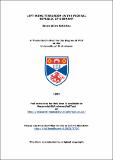Files in this item
Left-wing terrorism in the Federal Republic of Germany
Item metadata
| dc.contributor.advisor | Wilkinson, Paul | |
| dc.contributor.advisor | Stewart, Alasdair M. | |
| dc.contributor.author | Scharlau, Bruce Allen | |
| dc.coverage.spatial | 330 | en_US |
| dc.date.accessioned | 2013-06-18T15:31:52Z | |
| dc.date.available | 2013-06-18T15:31:52Z | |
| dc.date.issued | 1992 | |
| dc.identifier | uk.bl.ethos.361618 | |
| dc.identifier.uri | https://hdl.handle.net/10023/3720 | |
| dc.description.abstract | The Federal Republic of Germany has coped with indigenous left-wing terrorism for several decades and not lost its liberal democratic character f which raises the question of why terrorists continue to attract recruits to fight the state. This case study of terrorist motivation also elucidates the concept of identification, the lasting influence of someone, some group f or some idea on others, to aid the understanding of motivation and responses to terrorism. Identification also enables the integration of three entwined levels of terrorism study -individuals, groups and society. Elucidation of left-wing terrorism in the Federal Republic of Germany shows that a wide variety of persons became terrorists. The important factors in becoming a terrorist were the influence of 'significant others' both in the decision to join a terrorist group, and later within the group, as well as the perception that terrorism was the only available option. The terrorist groups formed 'macronarratives based on the group members' shared history and culture which supported their decisions to offer incentives and sanctions to group members to enable their underground existence. Not all of the groups sought to influence public policy. The Red Army Faction was mainly interested in group survival, as was the Second of June, while some of the Revolutionary Cells and Autonomen followed their self-interest in committing terrorist acts. Other Revolutionary Cells and Autonomen groups, however, sought public policy changes through terrorist acts in support of protest groups. The other groups had limited concepts of the 'public' which reflected their group direction. The government of the Federal Republic responded to left-wing terrorism with short-term paramilitary options taking precedence over the long-term socio-economic considerations. The German government generally has perceived all left-wing terrorist groups as the same, and not given due consideration to the different terrorist organisations perceptions of the 'public'. A clearer perception of left-wing terrorism in the Federal Republic of Germany shows the usefulness of the concept of identification in the study of terrorism, and highlights the processes involved in terrorist motivation at individual, group and society levels. | en_US |
| dc.language.iso | en | en_US |
| dc.publisher | University of St Andrews | |
| dc.title | Left-wing terrorism in the Federal Republic of Germany | en_US |
| dc.type | Thesis | en_US |
| dc.type.qualificationlevel | Doctoral | en_US |
| dc.type.qualificationname | PhD Doctor of Philosophy | en_US |
| dc.publisher.institution | The University of St Andrews | en_US |
This item appears in the following Collection(s)
Items in the St Andrews Research Repository are protected by copyright, with all rights reserved, unless otherwise indicated.

